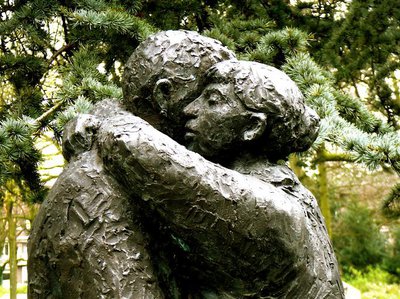Thoughts for the Day
Thursday, 17th August 2023: Forgiveness is all
Son of God Debt Matthew 18 Sin Forgiveness
Reading : Verses from Matthew, Chapter 18

Then Peter came and said to him, ‘Lord, if another member of the church sins against me, how often should I forgive? As many as seven times?’ Jesus said to him, ‘Not seven times, but, I tell you, seventy-seven times.
‘For this reason the kingdom of heaven may be compared to a king who wished to settle accounts with his slaves. When he began the reckoning, one who owed him ten thousand talents[ was brought to him; and, as he could not pay, his lord ordered him to be sold, together with his wife and children and all his possessions, and payment to be made. So the slave fell on his knees before him, saying, “Have patience with me, and I will pay you everything.” And out of pity for him, the lord of that slave released him and forgave him the debt. But that same slave, as he went out, came upon one of his fellow-slaves who owed him a hundred denarii; and seizing him by the throat, he said, “Pay what you owe.” Then his fellow-slave fell down and pleaded with him, “Have patience with me, and I will pay you.” But he refused; then he went and threw him into prison until he should pay the debt. When his fellow-slaves saw what had happened, they were greatly distressed, and they went and reported to their lord all that had taken place. Then his lord summoned him and said to him, “You wicked slave! I forgave you all that debt because you pleaded with me. Should you not have had mercy on your fellow-slave, as I had mercy on you?” And in anger his lord handed him over to be tortured until he should pay his entire debt. So my heavenly Father will also do to every one of you, if you do not forgive your brother or sister from your heart.’
(Lectionary, New Revised Standard Version)
Thoughts
On October 2, 2006, Charles C. Roberts walked into an Amish schoolhouse armed with three guns. There were 26 students in the school. He allowed the 15 boys, a pregnant female student, and three other adult females with infant children to leave safely, but held the remaining 15 girls captive. His deranged rationale for his actions was that he wanted revenge for something that had happened in his past. Letters that he left behind indicate anger toward himself and God for the death of his newborn daughter nine years earlier. Not long after police arrived Roberts started shooting, killing three children and himself. Two more children died later from their injuries.
In the face of such tragedy, one can only imagine the hurt and anger the loved ones of the victims might feel. But in an extraordinary act of forgiveness, members of the Amish community, including family members of those who had died, attended Robert’s funeral and comforted his widow. The Amish community did not stop there—they also offered financial support to Robert’s widow.
This is what forgiveness is about! We are to compare what we humans have done and still do, to God. Yet despite this God forgives us again and again. Human sin brought about the death of God's Son, Jesus, and yet this debt has been forgiven us. Because of this we too must forgive others again and again, or we can not expect to find mercy ourselves.
Prayer
Father God,
You answer our cries for help
and forgives our sins again and again,
yet we turn to blame as soon as someone
offends us,
and we find it difficult to forgive others.
May we learn to offer true forgiveness
to any who sin against us
and to show this through our actions.
Amen.
Verse two of this old hymn says it all:
- Rock of Ages cleft for me (Sung by Chet Valley Churches)